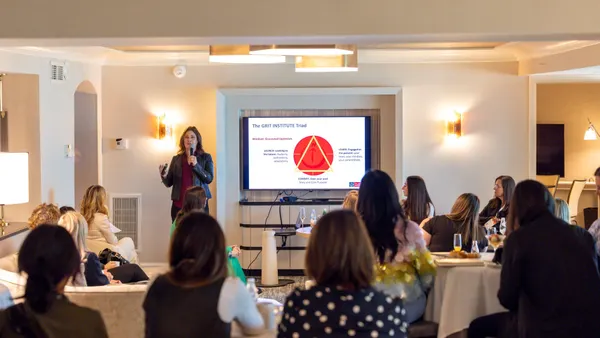The U.S. Department of Labor's (DOL) Office of Federal Contract Compliance Programs (OFCCP) proposed an expansion of the religious exemption in Executive Order 11246, which outlines non-discriminatory employment practices for federal government contractors, to include private, for-profit contractors with a "religious purpose."
The expansion, released on Aug. 14, would allow these contractors and subcontractors to cite their religious affiliation as a defense in employment discrimination claims, two employment lawyers told HR Dive. This includes cases that allege discrimination based on workers' gender identity and sexual orientation, which are not current protected classes under Title VII of the Civil Rights Act of 1964.
According to an OFCCP Federal Register filing, an organization that qualifies for the religious exemption under the proposed change is "conceived with a self-identified religious purpose," must "hold itself out to the public as carrying out a religious purpose" by stating that purpose on its website or advertisements and must "exercise religion consistent with, and in furtherance of, a religious purpose." Right now, only explicitly "religious corporations, associations, educational institutions and societies" qualify for exemption, the DOL's current rule states.
The proposed change comes as discussions of LGBTQ+ workplace protections and diversity and inclusion at work have picked up among HR departments — and in the federal government. The U.S. Supreme Court will review if Title VII protections extend to gender identity and sexual orientation this fall, and the Equality Act, which would also protect LGBTQ+ workers from discrimination, is under consideration in the U.S. Senate.
"Even if the Supreme Court decides next term that sexual orientation and gender identity are explicitly protected under Title VII, the exemption for religious organizations would remain," Haynes and Boone partner Adam Sencenbaugh told HR Dive via email. "Because the proposed rule is based on the agency's interpretation of existing case law for the religious exemption, it would take the Supreme Court (or Congress) revisiting that issue."
Rep. Bobby Scott, D-Va., said in an emailed statement that the expansion would not simply "weaken anti-discrimination protections in federal contracting," but also "give taxpayer-funded for-profit corporations extraordinary power to hire and fire employees based on religious beliefs," thus lowering the barrier between church and state.
As a self-identified queer woman who comes from a religious family, Ultimate Software's Director of Diversity, Equality and Belonging Cara Pelletier said she is "deeply saddened" by the proposed change.
"There's sort of a misconception that the federal ruling in support of marriage equality solved equality issues in the U.S. for LGBTQ+ people, when really there is no blanket protection on the federal level for individuals who are LGBTQ+ in the workplace," she told HR Dive in an interview. "We're in this really interesting place in the U.S., where people can be married to a same-sex spouse but be fired from their job for it."
While some view the proposed rule, which is open for comment until Sept. 16, as a blow to LGBTQ+ rights, others view it as a defense of religious beliefs, according to Robert J. O'Hara of Epstein, Becker & Green. He told HR Dive via email that Burwell v. Hobby Lobby Stores, Inc. was a case that furthered this idea that "sincerely held religious beliefs are not to be ignored or abrogated."
He wrote: "The [Supreme Court] has provided guidance on how those rights could be expressed and how they cannot be violated. That does not mean that the right supersedes other rights enshrined in the Constitution or other law, rather it elevates religious rights back to a level playing field (at least that's one way to look at it)."
For Pelletier, "writing off" groups of workers means missing out on their perspectives and talents, she said. HR departments are responsible for considering myriad points of view, and can find success in ensuring everyone is willing to make a workspace that is respectful and professional. HR departments with a commitment to diversity and inclusion can promote belonging and become better allies by supporting marginalized workers' initiatives — including employee resource groups, she said.
"It helps those groups understand that there's a place for them," she said. "Consider who's in your network today, and reach out to someone who's not like you."













